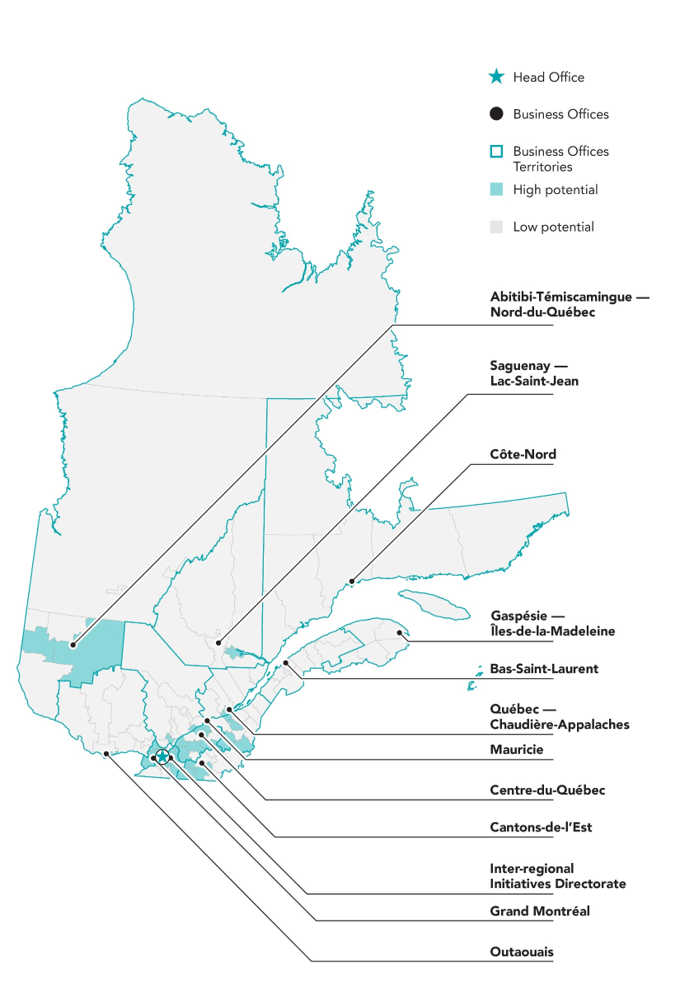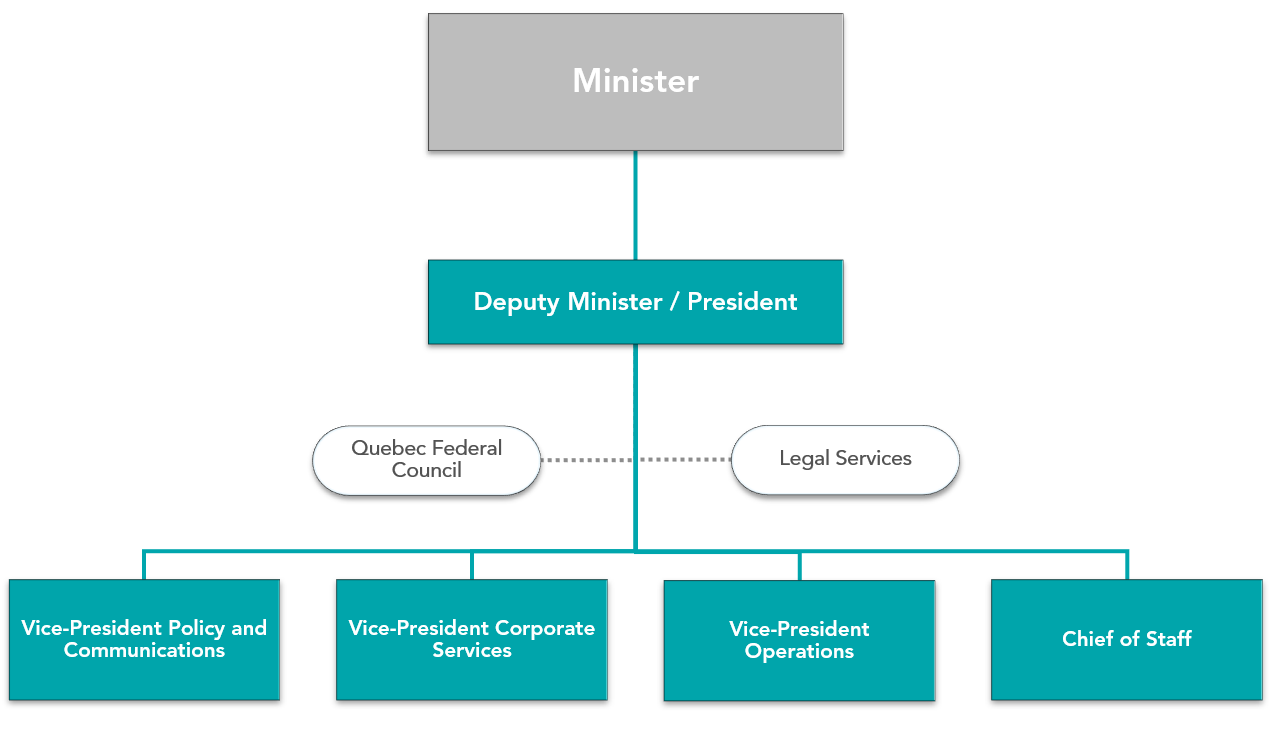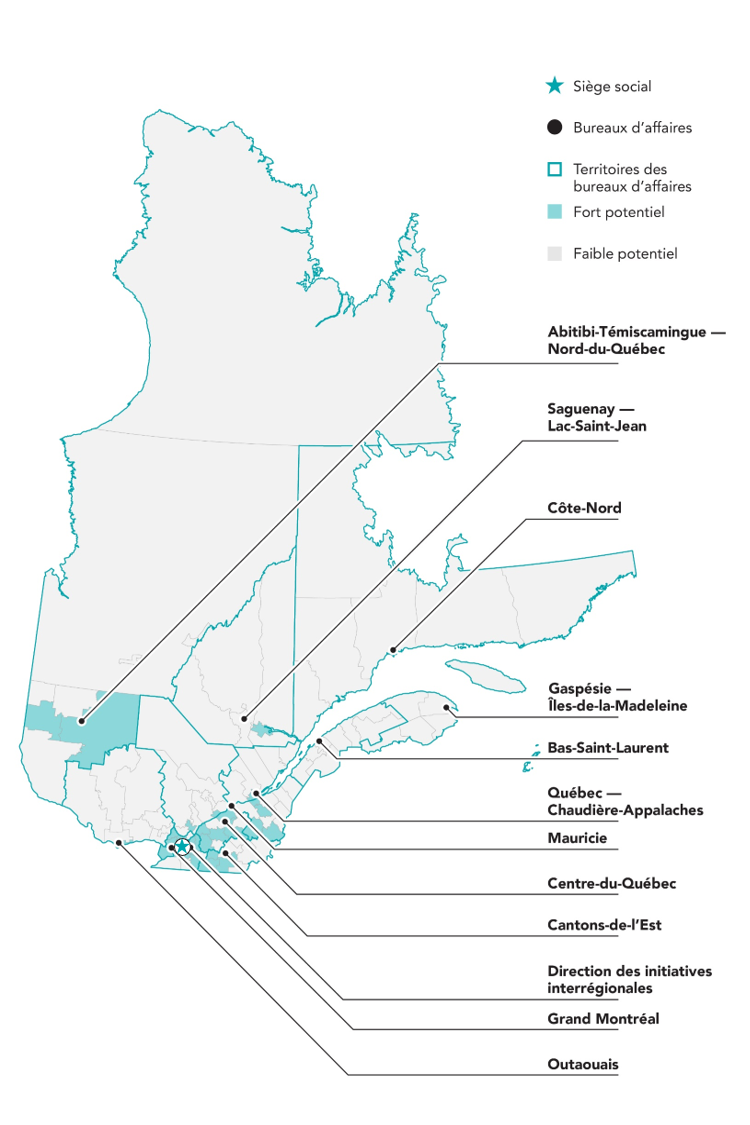Transition Binder 2021
Download the printer-friendly version (PDF)About this publication
Publication author: Canada Economic Development for Quebec Regions
ISBN: 978-0-660-40994-8
Catalog: Iu90-4/68-2021E-PDF
Publish date: January 18, 2022
Table of Contents
- Canada Economic Development for Quebec Regions (CED)
- We are present in all regions, at the heart of each distinct economic dynamic
- A unique approach: Focusing on Quebec as we implement federal priorities
- We act based on economic issues specific to Quebec
- We are adjusting to a variable economic recovery
- Our priority actions respond to the economic issues facing Quebec’s regions
- Our programs and initiatives are flexible and adapted
- Our clients: SMEs and the organizations that support them
- Our projects: Some examples
- Our budgets: Profile and evolution of our expenditures
- Tangible results and benefits
- CED at a glance
Canada Economic Development for Quebec Regions (CED)
- Over half a century of achievements in regional development
- Established under the Economic Development Agency of Canada for the Regions of Quebec Act
Mission:
“Promote the long term economic development of the regions of Quebec by giving special attention to those where slow economic growth is prevalent or where opportunities for productive employment are inadequate.
Promote cooperation and complementarity with Quebec and communities in Quebec.”
- Section 10 of the Act
We are present in all regions, at the heart of each distinct economic dynamic

Text version: Regions of Quebec
• Gaspésie–Îles-de-la-Madeleine
• Côte-Nord
• Bas-Saint-Laurent
• Abitibi-Témiscamingue – Nord du Québec
• Saguenay–Lac-Saint-Jean
• Québec – Chaudière-Appalaches
• Mauricie
• Centre-du-Québec
• Cantons-de-l’Est
• Greater Montreal
• Outaouais
• Inter-regional Initiatives Directorate
Of the 104 RCMs in Quebec, 71 have low economic development potential. The 33 RCMs with high economic development potential are located in the territories of the following business offices:
• Abitibi-Témiscamingue – Nord du Québec
• Saguenay-Lac-Saint-Jean
• Québec – Chaudière-Appalaches
• Mauricie
• Centre-du-Québec
• Cantons-de-l’Est
• Greater Montreal
• Outaouais
• Inter-regional Initiatives Directorate
- A head office in Montréal and 12 business offices rooted in the regions
- On the ground knowledge of factors influencing the development of each region
- Adapted financial support and accompaniment through actions centred around SMEs and the organizations supporting them
Our aim: To create the right conditions to foster economic growth in every region, based on their respective realities
Our priorities for action: To respond to issues as they are experienced on the ground
Our approach: Flexible, community focused, in collaboration with the Government of Quebec, key stakeholders, our federal partners
A unique approach: Focusing on Quebec as we implement federal priorities
National Priorities
- Implemented based on actual needs in the field
- Fuel reflections on priorities
Place-based approach
Flexible implementation
- Flexible, differentiated program terms depending on fields of action
- Modulated actions based on local realities, for results that meet real needs, while implementing federal priorities
- Ability to adapt to one-time needs and rapid execution
Credible antennas in the field
- Regional anchoring
- Field intelligence: How challenges are experienced and addressed and how our policies and programs must be responsive
- Engagement with provincial, regional and local players to strengthen federal relevance
Coordinated response when possible
- Complementary, synergistic actions, intersectoral cooperation, as well as among different levels of government
- Seeking out leverage effects and coherent action with community stakeholders
- Possibility of fostering linkages, especially among SMEs and prime contractors
Adapted design of programs and interventions
- For a diverse clientele: SMEs, NPOs, including tourist attractions, technology transfer centres, industrial clusters, incubators/accelerators, etc.
- For a range of structural projects that leverage the regions’ comparative advantages, regardless of sector
- Through flexibility financial tools to provide direct and indirect support, including:
- Repayable interest-free contributions for commercial projects (SMEs)
- Non-repayable contributions (NPOs)
We act based on economic issues specific to Quebec
Structural Issues
 Demographics - Decrease in relative weight plus aging population
Demographics - Decrease in relative weight plus aging population
- Population: 8.59M (22.5% of Canadian population)
- Median age: 42.7 years
- 14% immigrants (22% for Canada)
- 82% in urban areas representing 10% of the territory
 Economy - Currently strong, but still below its demographic weight
Economy - Currently strong, but still below its demographic weight
- 19.1% of Canada’s GDP
- Growing, low unemployment rate – but hindered by labour shortages
- Diversified economy based on small businesses, centred around services and manufacturing (255,350 SMEs) – but behind in investments, productivity, entrepreneurship and market diversification
- 18.1% of investments in Canada
- 17.5% of international exports
 Regions - Realities vary from one region to the next
Regions - Realities vary from one region to the next
- Major disparities among major centres, medium-sized cities and rural territories (connectivity, sectors, job creation and types)
Impacts of the Pandemic
An economy on hold
- Drop in nominal GDP: -5.3% in 2020 (+4.3% in 2019), including -10% for monthly GDP in March
- Initial employment slowdown at 2002 level
- Quebec’s manufacturing sector in 2020: The 3rd greatest annual decline in GDP in Canada (-9.1%)
A strong recovery
- Vigilance around the rise of a 4th wave
- April 2021: Quebec’s GDP exceeds pre-pandemic levels, at $382 billion
- In July 2021, one of the lowest unemployment rates; the hardest-hit sectors continue to be accommodation and food service
We are adjusting to a variable economic recovery
Good prospects in most major regional sectors, but some uncertainty still lingers.
Growth sectors In growth
Taking advantage of opportunities, in recovery mode
Factors:
- Infrastructure and residential construction
- Teleworking
- Online sales
- Digital acceleration
- Resilient supply chains
- Greater production capacity
Sectors under adjustment Under adjustment
Maintaining a certain level of activity and leveraging opportunities
Factors:
- Substitution effect: Increase in domestic tourism, grocery expenses, sales in product sub-categories, trend towards local buying
- Suppliers and sub-contractors are adapting
Sectors in difficulty In difficulty
Still being hit hard by the impacts of COVID-19
Factors:
- Lower demand for air transportation
- Border closures
- Cancellation or delay in the delivery of new devices
Regional Sectors
Abitibi-Témiscamingue Nord-du-Québec
- Mining In growth
- Wood processing In growth
- Tourism Under adjustment
Saguenay-Lac-Saint-Jean
- Aluminium In growth
- Food processing Under adjustment
- Wood processing In growth
Côte-Nord
- Mining In growth
- Aluminium In growth
- Tourism Under adjustment
Gaspésie-Îles-de-la-Madeleine
- Food processing Under adjustment
- Fisheries Under adjustment
- Tourism Under adjustment
Bas-Saint-Laurent
- Food processing Under adjustment
- Machine manufacturing Under adjustment
- Wood processing In growth
Centre-du-Québec (Centre-du-Québec et Montérégie)
- Food processing Under adjustment
- Machine manufacturing Under adjustment
- Metal products In growth
Cantons-de-l’Est (Estrie and Montérégie)
- Machine manufacturing Under adjustment
- Furniture In growth
- Metal products In growth
Greater Montreal (Montreal, Laval, Laurentides, Lanaudière and Montérégie)
- Aerospace In difficulty
- Software and video games In growth
- Logistics and transportation of goods In growth
- Computer systems In growth
Quebec - Chaudière-Appalaches
- Metal products In growth
- Medical equipment manufacturing In growth
- Computer products In growth
- Machine manufacturing Under adjustment
Outaouais (Outaouais and Laurentides)
- Food processing Under adjustment
- Computer systems In growth
- Tourism Under adjustment
Mauricie (Mauricie and Lanaudière)
- Machine manufacturing Under adjustment
- Software and video games In growth
- Metal products In growth
Our priority actions respond to the economic issues facing Quebec’s regions
| Issues | Impacts of the pandemic on the economy, sectors and regions | Shortage of labour / next-generation entrepreneurs | Shortcomings in commercialization / market diversification | Delay in productivity and investments | Climate change adaptation | Difficulty for devitalized communities to adapt |
|---|---|---|---|---|---|---|
| Priority actions |
Boosting the economic resilience of businesses and regions as we move out of the crisis (temporary) CED is implementing several targeted initiatives to support the economic recovery and help businesses and communities seize opportunities to position themselves for the future. |
|||||
|
Enhancing the competitiveness and expansion of Quebec businesses CED supports SMEs and the organizations that accompany them in developing, adopting, adapting and commercializing technologies that will boost their productivity, accelerate their growth and bolster their competitiveness on all markets. |
||||||
|
Fostering clean growth: CED encourages the development, adoption and commercialization of clean that will boost SMEs’ industrial productivity and competitiveness. |
||||||
|
Promoting vital communities: CED promotes growth for all by strengthening regions’ and communities’ entrepreneurial and industrial fabric through diversification, the enhancement of assets such as tourism, foreign investment promotion and support for participation in the economy for all and in all Quebec regions. |
||||||
Our programs and initiatives are flexible and adapted
 Regional Innovation
Regional Innovation
Supporting innovation through business productivity and growth and through regional ecosystems:
- Regional Economic Growth through Innovation (REGI)
 Vital Communities
Vital Communities
Helping communities seize development and diversification opportunities:
- Quebec Economic Development Program (QEDP)
- Community Futures Program (CFP)
- Economic Development Initiative (EDI) – Linguistic Duality
 Targeted Ad Hoc Support
Targeted Ad Hoc Support
Supporting development opportunities (national in scope or specific to Quebec or a region) within a prescribed time frame:
- National initiatives
- Linked to national issues
- Linked to COVID-19
- Linked to the recovery
- Initiatives specific to Quebec
CED benefits from an umbrella decree (M-30) to facilitate the implementation of its programs in Quebec.
Our clients: SMEs and the organizations that support them
Profile of SMEs Receiving Support (median)
- Age: 9.2
- Number of employees: 20
- Sales: $2.7M
- Main sector of activity: Manufacturing
Types of NPOs Receiving Support (not exhaustive)
- Sociétés d'aide au développement des collectivités (SADC) / Centres d’aide aux entreprises (CAE) (in rural areas)
- Industrial clusters
- Incubators/accelerators
- Technology transfer centres
- Promotion and structuring of tourism attractions
- Attraction of foreign direct investment
Source: The data are based on actions taken under regular programs (QEDP and REGI) between April 1, 2016, and March 31, 2021.
Our projects: Some examples
Projects under regular programs
Clean Technology
$2M in funding for Annexair, a business specializing in the design and manufacture of high-energy-performance ventilation units, to reduce the carbon footprint of its new intelligent plant and complete its manufacturing fleet by acquiring digital equipment.
Innovation
$114K in support for Rimouski-based Multi-Électronique, a business specializing in the design and manufacture of electronic hydrographic and oceanographic equipment, to complete the work needed to develop an innovative product.
Indigenous
$262K contribution for Basse-Côte-Nord business Innuberge, which offers ecotourism activities within the Unamen Shipu community, to launch a three-star hosting business.
Projects under pandemic-related measures
Tourism
$10M in support for the Alliance de l'industrie touristique du Québec to offer financial assistance to the province’s tourism businesses to implement adaptation measures in line with new health standards.
Regional Air Transportation Initiative
$8.8M in support for Pascan Aviation to help it enhance its service along certain routes. The project will enable it to acquire equipment to provide better connectivity in several of Quebec’s regions.
Canadian Seafood Stabilization Fund
$617K in support for Les Fruits De Mer Madeleine inc. to enable the business to respond to changes required around worker health and safety to counter the pandemic while also maintaining a productive workforce.
Our budgets: Profile and evolution of our expenditures
CED's Total Expenditures*
| 2016-2017 | 2017-2018 | 2018-2019 | 2019-2020 | 2020-2021 | 2021-2022 | |
|---|---|---|---|---|---|---|
| Operating | 41 499 367 | 44 590 099 | 3 282 004 | 45 785 111 | 48 563 262 | 53 312 617 |
| Initiatives | 48 888 891 | 62 482 563 | 11 463 957 | 47 562 012 | 258 209 323 | 343 749 737 |
| Regular Programs | 225 536 785 | 204 343 221 | 238 390 883 | 231 275 603 | 243 598 198 | 251 728 974 |
*Expenditures include the Employee Benefit Plan (EBP)
Our Labor Force
| 2016- 2017 |
2017- 2018 |
2018- 2019 |
2019- 2020 |
2020- 2021 |
2021- 2022 (as of 30 July 30, 2021) |
|
|---|---|---|---|---|---|---|
| FTE Trend | 330 | 320 | 322 | 334 | 359 | 390 |
Tangible results and benefits
443
$224K median
69%
A leveraging effect
$1 invested by CED to $5.65 invested by other sources
Increase in sales among businesses supported by CED from project start to project end
18 %
Lasting benefits: CED has helped create or maintain jobs in Quebec’s regions
20,986 jobs
Source: The data are based on actions under the regular QEDP and REGI programs between April 1, 2016, and March 31, 2021.
CED at a glance
Welcoming you
Supporting you so you can assume your duties rapidly and with fluidity
- Knowing your needs and giving you our support
- Obtaining a signature on CED’s schedules and agreeing on an approach to obtain your directives regarding projects
- Agreeing on briefing processes
- Agreeing on announcement processes
Understanding where you want to go
- Discussing your priority actions and giving you our best advice
- Presenting our ongoing initiatives and programs and discussing them
Additional information
Organizational structure

Organizational structure
- Minister
- Deputy Minister/President (Manon Brassard)
- Vice-President Policy and Communications
- Vice-President Corporate Services
- Vice-President Operations
- Chief of Staff
- Quebec Federal Council
- Legal Services
- Deputy Minister/President (Manon Brassard)
Are you getting questions?
Useful key messages on CED
- Canada Economic Development for Quebec Regions (CED) is a key federal partner in Quebec’s regional economic development.
- Present across Quebec through its 12 business offices tuned into their communities, CED supports businesses and regions to foster economic and community prosperity by giving priority to projects that generate long term economic benefits.
- CED accelerates economic development: Through its actions, it boosts regional innovation, SME growth and the vitality of Quebec’s communities.
- CED also plays a key role in enabling integration and linkages that bring the right partners together on a project.
- While continuing to support the long term growth of our economy and our regions, CED also implements several federal measures in Quebec to provide relief to businesses and regions hit by the economic impacts of the pandemic and accompanies them as they recover.
- CED maintains close collaborative relationships with its federal partners and the Government of Quebec, targeting complementary approaches.
Website and social media
- dec.canada.ca
- @DevEconCan
- Youtube
CED: A federal asset rooted in Quebec, for Quebec
Our mission
Promote the long-term economic development of the regions of Quebec
- With special attention to the regions with slow economic growth
- By assisting SMEs and the organizations that support them
- In complementarity with the Quebec Government and communities
- By bringing strategic partners together
Our intervention priorities
Support high-potential projects that respond to the economic challenges of the Quebec regions
| Issues | Impacts of the pandemic on the economy, sectors and regions | Shortage of labour / next-generation entrepreneurs | Shortcomings in commercialization / market diversification | Delay in productivity and investments | Climate change adaptation | Difficulty for devitalized communities to adapt |
|---|---|---|---|---|---|---|
| Priority actions |
Boosting the economic resilience of businesses and regions as we move out of the crisis (temporary) CED is implementing several targeted initiatives to support the economic recovery and help businesses and communities seize opportunities to position themselves for the future. |
|||||
|
Enhancing the competitiveness and expansion of Quebec businesses CED supports SMEs and the organizations that accompany them in developing, adopting, adapting and commercializing technologies that will boost their productivity, accelerate their growth and bolster their competitiveness on all markets. |
||||||
|
Fostering clean growth CED encourages the development, adoption and commercialization of clean that will boost SMEs’ industrial productivity and competitiveness. |
||||||
|
Promoting vital communities CED promotes growth for all by strengthening regions’ and communities’ entrepreneurial and industrial fabric through diversification, the enhancement of assets such as tourism, foreign investment promotion and support for participation in the economy for all and in all Quebec regions. |
||||||
Our presence
- A head office in Montréal
- 12 business offices rooted in the regions
- An understanding of the different regional economic dynamics
- Interventions tailored to the local development potential

Our approach
Operating with agility locally:
- Field intelligence – refined environmental assessment in order to design interventions that are adapted to the realities
- Flexibility in program design and implementation
- Collaboration with the various regional actors
- 359 FTEs* dedicated to programs and initiative development, delivery and assessment
Place-based approach: Flexible implementation, Adapted design of programs and interventions, Coordinated response when possible, Credible antennas in the field
*Data for 2020-21
Tangible results and benefits
443
$224K median
69%
A leveraging effect
$1 invested by CED to $5.65 invested by other sources
Increase in sales among businesses supported by CED from project start to project end
18 %
Lasting benefits: CED has helped create or maintain jobs in Quebec’s regions
20,986 jobs